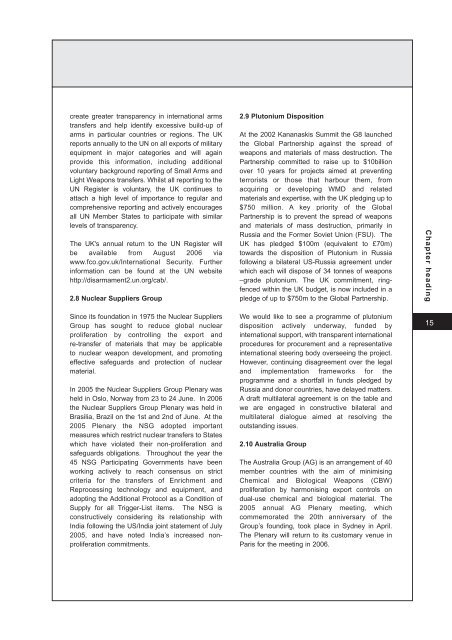Annex A - Official Documents
Annex A - Official Documents
Annex A - Official Documents
Create successful ePaper yourself
Turn your PDF publications into a flip-book with our unique Google optimized e-Paper software.
create greater transparency in international arms<br />
transfers and help identify excessive build-up of<br />
arms in particular countries or regions. The UK<br />
reports annually to the UN on all exports of military<br />
equipment in major categories and will again<br />
provide this information, including additional<br />
voluntary background reporting of Small Arms and<br />
Light Weapons transfers. Whilst all reporting to the<br />
UN Register is voluntary, the UK continues to<br />
attach a high level of importance to regular and<br />
comprehensive reporting and actively encourages<br />
all UN Member States to participate with similar<br />
levels of transparency.<br />
The UK's annual return to the UN Register will<br />
be available from August 2006 via<br />
www.fco.gov.uk/International Security. Further<br />
information can be found at the UN website<br />
http://disarmament2.un.org/cab/.<br />
2.8 Nuclear Suppliers Group<br />
Since its foundation in 1975 the Nuclear Suppliers<br />
Group has sought to reduce global nuclear<br />
proliferation by controlling the export and<br />
re-transfer of materials that may be applicable<br />
to nuclear weapon development, and promoting<br />
effective safeguards and protection of nuclear<br />
material.<br />
In 2005 the Nuclear Suppliers Group Plenary was<br />
held in Oslo, Norway from 23 to 24 June. In 2006<br />
the Nuclear Suppliers Group Plenary was held in<br />
Brasilia, Brazil on the 1st and 2nd of June. At the<br />
2005 Plenary the NSG adopted important<br />
measures which restrict nuclear transfers to States<br />
which have violated their non-proliferation and<br />
safeguards obligations. Throughout the year the<br />
45 NSG Participating Governments have been<br />
working actively to reach consensus on strict<br />
criteria for the transfers of Enrichment and<br />
Reprocessing technology and equipment, and<br />
adopting the Additional Protocol as a Condition of<br />
Supply for all Trigger-List items. The NSG is<br />
constructively considering its relationship with<br />
India following the US/India joint statement of July<br />
2005, and have noted India’s increased nonproliferation<br />
commitments.<br />
2.9 Plutonium Disposition<br />
At the 2002 Kananaskis Summit the G8 launched<br />
the Global Partnership against the spread of<br />
weapons and materials of mass destruction. The<br />
Partnership committed to raise up to $10billion<br />
over 10 years for projects aimed at preventing<br />
terrorists or those that harbour them, from<br />
acquiring or developing WMD and related<br />
materials and expertise, with the UK pledging up to<br />
$750 million. A key priority of the Global<br />
Partnership is to prevent the spread of weapons<br />
and materials of mass destruction, primarily in<br />
Russia and the Former Soviet Union (FSU). The<br />
UK has pledged $100m (equivalent to £70m)<br />
towards the disposition of Plutonium in Russia<br />
following a bilateral US-Russia agreement under<br />
which each will dispose of 34 tonnes of weapons<br />
–grade plutonium. The UK commitment, ringfenced<br />
within the UK budget, is now included in a<br />
pledge of up to $750m to the Global Partnership.<br />
We would like to see a programme of plutonium<br />
disposition actively underway, funded by<br />
international support, with transparent international<br />
procedures for procurement and a representative<br />
international steering body overseeing the project.<br />
However, continuing disagreement over the legal<br />
and implementation frameworks for the<br />
programme and a shortfall in funds pledged by<br />
Russia and donor countries, have delayed matters.<br />
A draft multilateral agreement is on the table and<br />
we are engaged in constructive bilateral and<br />
multilateral dialogue aimed at resolving the<br />
outstanding issues.<br />
2.10 Australia Group<br />
The Australia Group (AG) is an arrangement of 40<br />
member countries with the aim of minimising<br />
Chemical and Biological Weapons (CBW)<br />
proliferation by harmonising export controls on<br />
dual-use chemical and biological material. The<br />
2005 annual AG Plenary meeting, which<br />
commemorated the 20th anniversary of the<br />
Group’s founding, took place in Sydney in April.<br />
The Plenary will return to its customary venue in<br />
Paris for the meeting in 2006.<br />
Chapter heading<br />
15

















